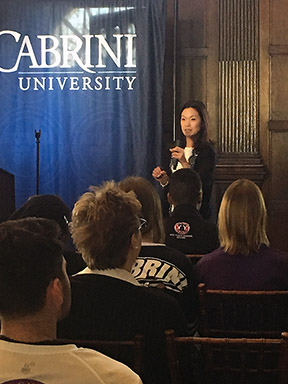Human trafficking is a $32 billion-a-year industry. That is $10 billion more than McDonalds’ annual revenue and almost $11 billion more than Target’s. In every country and in every one of the United States, the victims of slavery are everyday humans: They can be your neighbor, your friend, or the person sitting next to you on the bus.
 These disturbing facts were presented as part of an impassioned talk by Pearl Kim, JD, at Cabrini University on March 29, 2017. Kim is the Senior Deputy Attorney General within the Executive Office of the Pennsylvania Office of Attorney General and a fierce advocate in the fight against human trafficking and sexual assault. She defends victims that others may discount and embodies Cabrini’s mission to stand up for universal human rights and dignity.
These disturbing facts were presented as part of an impassioned talk by Pearl Kim, JD, at Cabrini University on March 29, 2017. Kim is the Senior Deputy Attorney General within the Executive Office of the Pennsylvania Office of Attorney General and a fierce advocate in the fight against human trafficking and sexual assault. She defends victims that others may discount and embodies Cabrini’s mission to stand up for universal human rights and dignity.
Twenty-two percent of human trafficking is sex slavery, and the average age of entering prostitution is 13 years old. “It breaks my heart that people think that because someone is a prostitute, she doesn’t deserve justice,” Kim said. “You do not know if a person was extorted, coerced, or physically or emotionally abused into their current situation.”
Kim’s passion for human rights was palpable in the crowded Mansion foyer, as she paced the floor as if making her case to a jury. Maybe she had forgotten that many of the students, faculty, and staff in the audience participate in social advocacy courses and activities to combat trafficking. Kim discussed previous cases, using them to highlight the importance of updating the laws in Pennsylvania to better protect victims. She pulled up a slide and said, “This was my first successful conviction for human trafficking. I want you to look at the date … 2012,” Kim paused. “This was the first conviction for trafficking in Pennsylvania.”
In 2014, the laws were updated, allowing for new legislation and new charges for prosecutors, making the law more aligned with the realities of human trafficking—that it’s not like it is in the movies. “Trafficking and prostitution don’t have to be for money,” Kim explained. “Especially with underage runaways who may be willing to do something for food or shelter.”
“I have never seen such broken human beings as I have with the victims of human trafficking,” Kim told the group. She encouraged everyone to put the National Human Trafficking Resource Center hotline number, 888.373.7888, in their cell phones and to be vigilant for the signs of trafficking victims: having an older boyfriend, constantly avoiding eye contact, showing signs of abuse, having few or no personal possessions, or not having control of money or identification.
If you would like to do more to help in the fight against human trafficking, you can donate to Cabrini Closet, a resource for victims of trafficking run by Cabrini’s founding order, the Missionary Sisters of the Sacred Heart of Jesus (cabriniformation@mothercabrini.org).